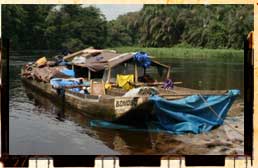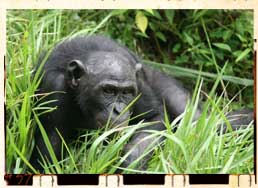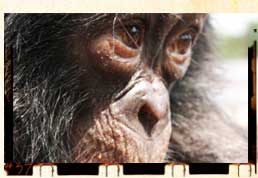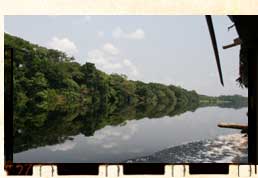Tuesday 22 November 2005
I heard a rising hubbub down the village path. Initially I thought maybe the peasants
were massing with pitchforks and torches to lynch us on account of Arne's satanic
frog rituals and Mephistolean eyebrows and beard. Turns out it was democracy on the
move.

Democracy on the move (Photo- Martin Bendeler)
Voter registration. Computer database. Biometrics fingerprint and digital photograph.
Dell laptop in protective foam casing. In a BCI community centre using BCI
generator and UHF radio. The 4 person team had walked from Djolu, with porters and
Two policemen. Long line. 3-5 per hour. 10,000 to register in this area alone.
Registration to continue well into December. A young man had set up a stall on a
table selling combs, razorblades, antibiotic cream, 50 cent torches and small mirrors.
Democracy's camp follower. Some pigs wandered around. I think I saw some
bonobos waiting patiently in line to register. They're very intelligent, you know.
Two CREF (Centre for Ecological and Forestry Research) researchers arrived by bike
from Wamba. They do most of the legwork for the Japanese, who treat them quite
poorly. The University of Kyoto team seem, not entirely unreasonably, more devoted
to research than bonobo conservation, with its attendant community development
imperatives. But hard to do research on dead bonobos….
More bonobo observations from Congolese field researchers-
The alpha male makes most of the major decisions- when to wake up and when to
sleep, when to move on from feeding or napping, threat assessment and response,
territorial defence etc. However, the alpha female, who may often be the mother of
the alpha male (kind of a King and Queen Mother type of monarchy) and some of his
allies, has a veto and noone will follow the alpha male if she doesn't. The alpha
female is the only group member permitted to groom the alpha male. Bonobos will
always fight if another group violated their territorial integrity, often inflicting deep
wounds, but never killing, let alone the brutal mutilation characteristic of chimp
conflicts. Group encounters between fractured groups (when one splits from another)
are peaceful. There is never any serious violence within the group.
Leonard said that while he could not confirm the veto power of the female, the alpha
male definitely made most of the decisions. Moreover, when the group moved, one
male would always take the point while another would bring up the rear. He
considered the current alpha, Raphael, was on his way out as he was getting older and
had moved from the fore to the rear.
After Japanese ended provisioning, the bonobos ranging much further, sometimes
more than 20kms in a day. Much harder to analyse group dynamics as most
observations now are made of arboreal behaviour. Very hard to track on ground. The war reduced the size of their study group from 45 to 23.
The African researchers said that while provisioning continued, there was no research
or even interest in the extent of bonobo range or their territory.
With provisioning or captivity, the closer proximity to each other leads to different
outcomes than in the wild. For example- when an alpha chimp is about to completely
go off his rocker over something, he will stand and sway for about 10 seconds, his
eyes will glaze over and then heaven help whoever gets in his way. However, in
captivity, there is often time for for females to quickly remove all possible weapons
from near the alpha before he starts his rampage. In the wild, with wider foraging, this cannot happen.
Similarly, key aspects of bonobo behaviour may depend on the conditions in which
their livelihood is obtained. It could well be that the complex shared responsibilities
and checks and balances between the sexual leadership that prevails when open
ranging for food is warped when food is centrally located. Perhaps almost a reverse of
human history, where settled agriculture allowed powerful men to establish violent
monopolies over land and by extension, food and women.
Strange to think of the bonobo alpha male, emasculated by Japanese provisioners. All
his responsibilities- directing the troop, guarding the perimeter- made redundant by a
sedentary lifestyle.
Half jokingly thought that it was not the end of provisioning that brought about moreviolently territorial behaviour but the contemporaneous outbreak of war. Maybe the
bonobos were influenced by human behaviour to become more defensive and less
trusting.
Also thought that maybe the war may not have been the only reason for the reduction
in Wamba bonobo numbers. Perhaps pre-war, the bonobos had been smart enough to
migrate from other areas for the free Japanese food and then they returned to their
traditional ranges after provisioning ceased….










